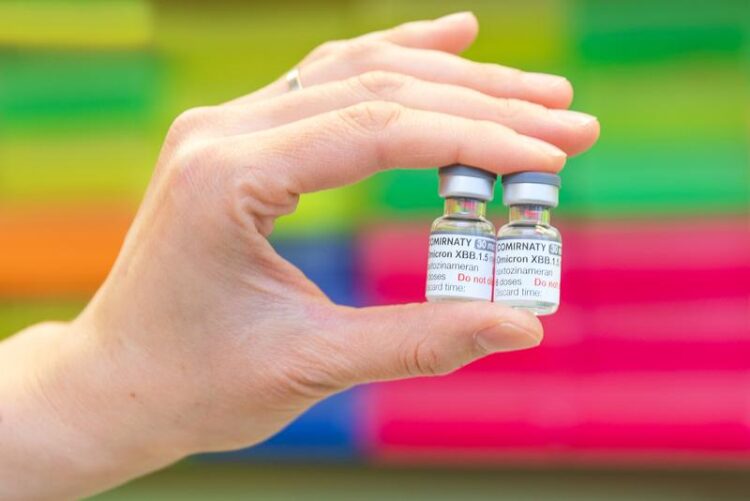Effectiveness of the new Omikron booster confirmed

Effectiveness confirmed: The corona booster vaccine from Biontech adapted to the Omikron variant XBB.1.5.
(c) Karin Kaiser/MHH
MHH study investigates Biontech vaccine for booster vaccination against the current coronavirus variant XBB1.5.
The pandemic is over, but many people in Germany are still infected with the coronavirus. The current Omikron variants in particular are highly contagious. The new booster vaccines from Biontech and Moderna are specially adapted to the Omikron subline XBB.1.5. However, the effectiveness of the new boosters has not yet been proven. A study by the Department of Rheumatology and Immunology at Hannover Medical School (MHH) has now closed this gap. In cooperation with the MHH Institute of Immunology and the German Primate Centre Göttingen, the researchers have published the world’s first paper on the new XBB.1.5-based vaccine from Biontech. As part of the “COVID-19 Contact (CoCo)” study at the MHH, 53 MHH employees who received the vaccine were examined. Their immune response was then measured. The result: after vaccination with the new booster, antibodies against Omikron variants increased significantly. The work has been published in the renowned journal “The Lancet Infection Diseases”.
Immune defence strengthened
“We have not only found a large number of neutralising antibodies against Omikron XBB.1.5, but also against other sub-variants,” says senior physician Professor Dr Alexandra Dopfer-Jablonka, who is leading the immune study together with her clinical colleague Professor Dr Georg Behrens. This means that the vaccine not only triggers the immune defence against the currently dominant coronavirus variant XBB.1.5, but also activates the body’s own defences against the currently spreading variants “Pirola” (BA2.86) and “Eris” (EG1.5). “The B cells that produce antibodies against Omikron increased significantly and the T cells were also strengthened by the vaccination,” explains the rheumatologist. “The data show that the new booster vaccination achieves its goal and also induces antibodies against new SARS-CoV-2 variants.”
Defence in two directions
Like the first coronavirus vaccines from Biontech and Moderna, the new booster is again an mRNA vaccine, i.e. it consists of messenger RNA. The principle: The mRNA contains the genetic information for the blueprint of the so-called spike protein, which is located on the surface of the coronavirus and with the help of which the virus enters the cells. This genetic information is read in the body’s cells and the spike protein is produced. The immune system recognises the protein as foreign to the body, triggers a defence reaction and develops immune protection. Unlike last season’s bivalent vaccines, the new vaccines only contain mRNA of the Omikron variant. “The new boosters nevertheless activate a backward and a forward defence,” says Professor Dopfer-Jablonka. Only the Biontech vaccine was analysed in the study. “However, as the Moderna vaccine is also adapted to XBB.1.5, we expect it to be equally effective.” The same applies to the booster vaccine from the manufacturer Novavax, which has also been adapted to XBB.1.5 and authorised by the European Commission.
Work based on the MHH CoCo study
“The work is once again a great team success and the result of the CoCo study, which is made possible and supported by MHH employees,” emphasises Professor Behrens. The CoCo study started in March 2020 and uses blood samples to investigate immune reactions against SARS-CoV2 in employees of the MHH and affiliated institutions. “Our data can also make a significant contribution to better understanding the long-term immune response against SARS-CoV-2 and assessing the success of the vaccination,” says the physician.
According to the Standing Committee on Vaccination (Stiko), a booster vaccination with the new, adapted vaccine is recommended for everyone aged 60 or over. In addition, all people who are at particular risk of a severe course of the disease due to an underlying illness should be boosted. The Stiko also recommends the booster vaccination for residents of care homes and for employees in the care and healthcare sector. The booster vaccination should be repeated annually, preferably in autumn.
Wissenschaftliche Ansprechpartner:
Professor Dr Alexandra Dopfer-Jablonka, jablonka.alexandra@mh-hannover.de, phone +49 511 532-5337
Originalpublikation:
https://www.thelancet.com/journals/laninf/article/PIIS1473-3099(23)00690-4/fullt…
Media Contact
All latest news from the category: Health and Medicine
This subject area encompasses research and studies in the field of human medicine.
Among the wide-ranging list of topics covered here are anesthesiology, anatomy, surgery, human genetics, hygiene and environmental medicine, internal medicine, neurology, pharmacology, physiology, urology and dental medicine.
Newest articles

Recovering phosphorus from sewage sludge ash
Chemical and heat treatment of sewage sludge can recover phosphorus in a process that could help address the problem of diminishing supplies of phosphorus ores. Valuable supplies of phosphorus could…

Efficient, sustainable and cost-effective hybrid energy storage system for modern power grids
EU project HyFlow: Over three years of research, the consortium of the EU project HyFlow has successfully developed a highly efficient, sustainable, and cost-effective hybrid energy storage system (HESS) that…

After 25 years, researchers uncover genetic cause of rare neurological disease
Some families call it a trial of faith. Others just call it a curse. The progressive neurological disease known as spinocerebellar ataxia 4 (SCA4) is a rare condition, but its…





















